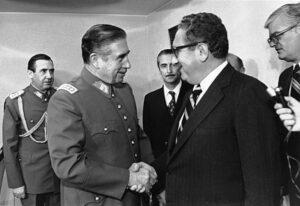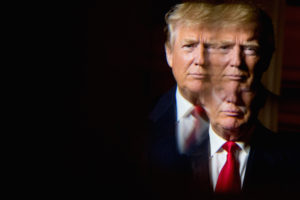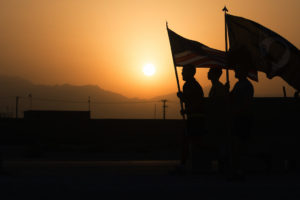Truthdigger of the Week: Tom Engelhardt
At least three times a week, there is one place online where readers can go for the most comprehensive coverage possible of the workings of American Empire.
This month, Ronald Reagan’s former assistant Treasury secretary, Paul Craig Roberts, wrote in a piece on the virtues of truth-telling that “There has never in history been a population as unaware as Americans.” At least one Truthdig reader found that claim to be unreasonable. Slice 150,000 years of human societies up by the availability of public education to the general populace and the criticism bears weight. But consider the profound power of corporate news, advertising and political and economic propaganda to muddle Americans’ minds in a continent dotted with televisions, cellphones and personal computing devices and Roberts’ claim becomes difficult to rebut.
The post-9/11 world saw a flowering of left-wing news and opinion websites in response to the desolate path neoliberal economics and neoconservative foreign policy were tearing through the world. This site is one of them. Their purpose was to tell the American public an alternative story to the one it was hearing in the corporate-owned press, a tangle of organizations whose corruption by money and advertising was so advanced that they actually led the charge into two unjustified wars that would radically change the lives of hundreds of millions of people across the globe. The task facing journalists who remained committed to the truth then, was to describe the nature and ongoing operation of this empire of military, corporate, government and media interests in ways that made its fraudulence and destructiveness unfailingly clear.
In November 2001, when work crews were still sorting the rubble that remained of the World Trade Center towers in lower Manhattan, journalist, editor and author Tom Engelhardt launched an email publication that offered “commentary and collected articles from the world press.” More than a year later Engelhardt’s mailer was branded TomDispatch and rolled out as a project of The Nation Institute. Since then, it has published some of the most expert voices on war, privacy and national security, climate change, economic ruin, financial skullduggery and the straightforward corruption of politics, all in original, in-depth and meticulously researched investigative reports.
TomDispatch is “a regular antidote to the mainstream media,” exactly as its tagline says. If Engelhardt, his small editorial team and their league of contributors (which includes environmentalist Bill McKibben, political writer Rebecca Solnit and historian and national security reporter Nick Turse) were invited to explain their findings nightly on U.S. television, the public would be far better informed about its government’s role in shaping a world that Americans increasingly fear and seek protection against.
This is one of Engelhardt’s main themes. He took it up most recently in “The Enemy-Industrial Complex,” an article published on TomDispatch on April 14. If the “blowback” that is a consequence of American aggression abroad was not so reliable, it would be correct to call Engelhardt’s article uncanny. But as the journalist has made clear throughout his long body of work, there is a logic to the violence that the United States routinely suffers. It is true that there are genuine enemies abroad. But such enemies have been one of the prime manufactures of America’s antagonistic foreign and economic policies since World War II ended and the Cold War race to build more doomsday machines than the Soviet Union, our then exceedingly frail and floundering imperial bete noire, began.
What Osama bin Laden achieved with the attacks of Sept. 11, 2001, Engelhardt tells us, was the creation of “an instant sense of an enemy so big, so powerful, that Americans found ‘war’ a reasonable response; big enough for those who wanted an international police action against al-Qaeda to be laughed out of the room; big enough to launch an invasion of revenge against Iraq, a country unrelated to al-Qaeda; big enough, in fact, to essentially declare war on the world.”
“Without an enemy of commensurate size and threat,” Engelhardt continues, “money at ever escalating levels would never have poured into homeland security, or the Pentagon, or a growing complex of crony corporations associated with our weaponized safety. The exponential growth of the national security complex, as well as of the powers of the executive branch when it comes to national security matters, would have far been less likely.”In short, without a public perpetually terrified of a resilient global terrorist bogeyman, American military aggression and the multibillion-dollar industry that enables it would have been impossible to justify and create. We would have no Department of Homeland Security; no 17-outfit, $75 billion U.S. Intelligence Community; no secret, endless wars via remote-controlled plane and a financially flush “drone lobby” to promote it.
No, without the crippling influence of fear (which Engelhardt recognizes as a new American way of life) insisted upon by politicians and fanned by a compliant, drum-beating press, the security state that we have been watching develop over the last 12 years would have been preposterous to imagine.
The word “uncanny” could have been an appropriate description of Engelhardt’s piece because it was posted less than 24 hours before the Boston Marathon bombings, in which three people were killed and 185 injured in two blasts set off by the kind of enemy American policy has created in the real world as well as in the minds of the terrified public. The concurrence of those events serves to demonstrate the journalist’s relentless prescience and his importance as a teacher in a world created by fear and governed by powerful institutions and chance.
This view is confirmed by Engelhardt’s insight into what the bombings will ultimately mean for the rights of Americans. In a comment on his article written on Facebook on the day after the explosions, he warned that the tragedy would be used to justify the fortification and expansion of the American police state:
It’s exactly when we experience a nightmare like yesterday’s bombing of the Boston Marathon that we need a serious assessment of risk and danger in this country. An event like this, horrific as it is, and the panic that goes with it will inevitably be the spark for yet greater investment, both emotionally and financially, in the national security state, greater up-armoring of the police, a further militarization of society, further moves to give latitude to intelligence agencies as they search amongst us, and so on. Perhaps counterintuitively, this is exactly the moment for a piece like the one I wrote yesterday – though obviously I had no crystal ball and couldn’t see a terror bombing coming – on the general lack of major enemies in our American world. The panic of a terrible event like this makes us even blinder to reality, to what dangers we actually face (and don’t face), globally and locally. The murder of innocents is always a terrible and tragic thing, but it’s also a moment to suck it up and not plunge deeper into the twenty-first century American Big Muddy. Terror is a horrific thing, but it does not truly endanger us as a country. It is, in many ways, strangely helpless, even when it can kill and wound small (or even, as on 9/11, large) numbers of people. Give into it and you’re not really “safe,” you’re just in another America.
Civil rights lawyer and national security writer Glenn Greenwald updated Engelhardt’s warning in an article published on The Guardian on Saturday. Suspected bomber Dzhokhar Tsarnaev was captured Friday night, and in the supposed name of national security, was never read his Miranda rights. To the cheers of many Americans, Republican Sens. Lindsey Graham and John McCain quickly called for the 19-year-old to be treated as an enemy combatant and denied legal representation. Americans allow for such a suspension at their own peril, Greenwald wrote. “When you cheer for the erosion of [Tsarnaev’s] rights, you’re cheering for the erosion of your own,” he pointed out.
For Tom Engelhardt’s tireless and ongoing demonstration of the ways American politicians and their partners in business are making the world a more dangerous place, and for inspiring and encouraging, by example and personal attention, a large number of young journalists who are striving to document the same, we honor him as our Truthdigger of the Week.
Your support matters…Independent journalism is under threat and overshadowed by heavily funded mainstream media.
You can help level the playing field. Become a member.
Your tax-deductible contribution keeps us digging beneath the headlines to give you thought-provoking, investigative reporting and analysis that unearths what's really happening- without compromise.
Give today to support our courageous, independent journalists.






You need to be a supporter to comment.
There are currently no responses to this article.
Be the first to respond.